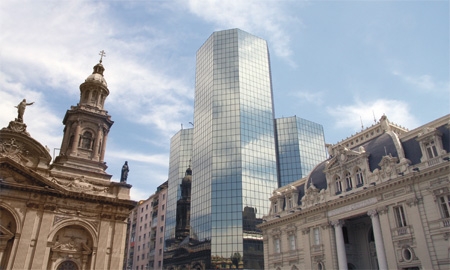
2010 was a landmark year for Chile, beginning with a run-off presidential election, which saw the first center-right candidate, Sebastian Piñera of the Coalition for Change, democratically elected to office in more than half a century. This was followed shortly by the earthquake in February that registered 8.8 on the Richter scale, making it one of the strongest ever recorded.
In May 2010, Chile became the first South American country to join the Organization for Economic Cooperation and Development (OECD). More major events came later in the same year. The world watched the euphoric rescue of the 33 miners who had endured 69 days trapped underground. 2010 was also a bicentennial year: on September 18, the country celebrated 200 years of independence from Spain.
Despite the setbacks caused by both the earthquake and the global financial downturn, Chile is determinedly rebounding thanks to its diversified economic base, political stability and self-confidence, among other factors.
Strong U.S. relations
“If one looks back, Chile has clearly suffered hard times due to the global crisis. This is because Chile has a completely open economy,” explains Peter Hill, president of the Santiago Chamber of Commerce. “And one may wonder how it is possible that a country that lived through such a costly earthquake so recently can now be enjoying economic growth of 6%. How? Why? What changed? I believe the most important thing is that Chile has changed its vision of world business: now there is greater confidence, there is a greater sense of calm and knowing that the country will continue to move forward, and that we’ll once again grow at the same pace as before.”
‘CHILE ISN’T THE BIGGEST, RICHEST OR MOST POWERFUL COUNTRY IN THE WORLD, BUT WE SHOULD DEDICATE OURSELVES TO TRANSFORMING IT INTO THE BEST COUNTRY IN THE WORLD’ SEBASTIAN PIÑERA, |
U.S. Ambassador to Chile Alejandro Wolff attributes the country’s success to “stability, predictability and a national consensus about broad trends and policies,” adding that “this creates an attractive environment for economic growth and investment.”
Stretched along South America’s southernmost Pacific coast for thousands of miles, Chile’s skinny profile is easy to pick out on a map. For those in the northern hemisphere, Chile – complete with its deserts, high Andes, lush forests, bright lakes and glaciers – is sometimes considered the “end of the world”. However, this has proven to be no barrier to Chile’s rise in the global economy.
When President Barack Obama visited this frontier country in March this year (on what was the first visit by a U.S. president to Chile in more than 20 years), he said that despite its physical remoteness, “this nation is part of our interconnected world.”
Toasting President Piñera and his predecessors at the meeting, President Obama said: “Despite barriers of distance and geography, you’ve integrated Chile into the global economy, trading with countries all over the world and, in this Internet age, becoming the most digitally connected country in Latin America.”
During their meeting, the two presidents signed various Memorandums of Understanding, including one between Chile’s National Emergency Office and the U.S. Federal Emergency Management Agency (FEMA), regarding disaster preparedness, mitigation and response. They also expressed their support for various bilateral initiatives, such as the U.S.-Chile Energy Business Council, which is focused on clean energy infrastructure and development, and the new Andean Glacier Monitoring and Research Center, which will twin Chile’s Francisco Coloane Coastal and Marine Protected Area with Alaska’s Glacier Bay National Park and Preserve.
Furthermore, Presidents Obama and Piñera underscored the importance of the U.S.-Chile free trade agreement (FTA) signed in 2004, pointing out that not only has bilateral trade doubled and conditions for the exchange of goods and services improved, but also that new business opportunities have arisen, resulting in a greater diversification of products.
Chile’s relationship with the U.S. has traditionally been warm, and Ambassador Wolff calls it a special one that has endured many changes on both sides. “Chile’s political, economic, social and scientific successes are some of the reasons why this relationship has flourished. It is a relationship that has been developing for many years now, and it cuts across administrations and political parties,” he says.
Robust Economy
Chile’s economy, like its relationship with the U.S., is in good health. The Economist Intelligence Unit predicts gross domestic product (GDP) growth of 6.2% in 2011, largely due to heavy post-earthquake reconstruction investments. Over the period 2012-2015, this growth is expected to level off at a stable 4.9%. Chile’s ratio of public debt to GDP ratio, the lowest among major Latin American economies, should peak at just 10.2% this year, and the country’s two sovereign wealth funds – which together amount to some US$16.8 billion – are seeing the benefits of a windfall surplus from copper revenues.
High commodity prices, coupled with robust domestic and external demand (especially from resource-hungry China, Chile’s top export market), are pushing strong economic growth, and helping Chile to bear the costs of reconstruction and social programs.
Although President Piñera has adopted an undeniably business-oriented outlook for his administration, he has not broken altogether with his left-leaning predecessors. Indeed, his strong social agenda has been criticized among party members for being too left-wing.
The President is pushing through structural reforms aimed at boosting competitiveness and productivity. The Piñera administration is promoting entrepreneurship and the simplification of business processes by cutting excessive red tape, and making the labor market more flexible.
These reforms, combined with Chile’s self-confidence and the world’s faith in the country, may well be the stepping stones for Chile to achieve its vision of becoming Latin America’s first developed nation by the end of this decade.
0 COMMENTS